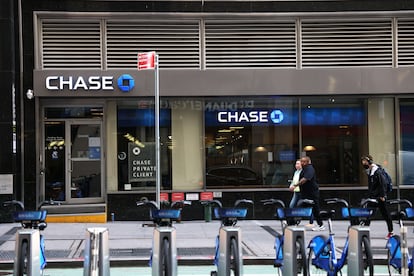US banks feeling the economic slowdown as profits fall
The six largest lenders saw year-over-year net earnings decline in the third quarter due to lower investment banking activity and greater credit loss provisioning


America’s biggest banks are feeling the deterioration of the US economy, and bracing for more bad news. Year-on-year profits for the third quarter dropped across all the main financial groups on Wall Street due to slower investment banking activity and more provisioning of safety funds to cover potential loan losses, despite the fact that rising interest rates also pushed up their revenue.
The six largest lenders in the United States (JPMorgan Chase, Bank of America, Citigroup, Wells Fargo, Goldman Sachs and Morgan Stanley) made a combined $29.42 billion in profits between July and September, 23% less than over the same period in 2021. The economic recovery in 2021 encouraged banks to release funds that had been set aside to cover possible loan defaults derived from the Covid pandemic that did not materialize. If the big six released $4.5 billion in the third quarter of 2021, this year they set aside $4.1 billion due to the deterioration of the global economy and the uncertainties about the future as the world grapples with soaring inflation, supply chain problems and the fallout from the war in Ukraine.
Investment banking activity took a particularly big hit, dropping to half of what it was as economic uncertainty and falling stocks slowed down operations in the capital markets. On the other hand, personal banking revenue grew on the back of rising interest rates.
JPMorgan
The Q3 earnings released by JPMorgan reflect all these trends. The largest bank in the US reported net income of $9.7 billion, a 17% decline from the same period last year, due entirely to greater credit loss provisions amounting to $1.5 billion, up $808 million from the same period in 2021.
JPMorgan, however, also saw a 10% increase in total net revenue to $32.7 billion. With every rate hike announced by the Federal Reserve, banks have moved to charge higher interest on their loans before raising the rates on savings deposits, helping boost that margin. On the other hand, lower investment management and banking activity reduced JPMorgan’s revenue on that front by 47% to $1.7 billion.
The bank’s chief executive, Jamie Dimon, has predicted a recession in the US and sees a soft landing for the economy as unlikely. At the earnings call on Friday, Dimon pointed out that consumers and companies continue to be in good financial health, but that risks are accumulating. In an interview with CNBC, he warned about the possibility of a recession in the US within six to nine months.
Bank of America

Bank of America has weathered the deteriorating economic conditions in better conditions. Profits at the second largest bank in the United States fell 8% in the third quarter to $7.08 billion, while interest rate hikes allowed its interest margin to skyrocket by 24%, to $13.78 billion, the highest quarterly figure in the last decade. The improvement in revenue from personal banking and fixed income trading activities allowed the group based in Charlotte (North Carolina) to offset the $378 million increase in credit loss provisions to $898 million and the 46% drop in investment banking revenue from $2.2 billion to $1.2 billion, according to its earnings statement.
Citigroup
Citigroup had profits of $3.5 billion in the third quarter, down 25% from the same period in 2021, as reported by the bank. The lender set aside $370 million to cover the uncertainties affecting the economy, while net interest income grew 6% to $18.5 billion. Like other entities, Citigroup fared much better in its personal banking business than in investment banking, where revenue fell 64% to $631 million due in part to a lower appetite for mergers and acquisitions, said CEO Jane Fraser.

The bank took advantage of its earnings presentation to announce that it will end nearly all the institutional banking services it offers in Russia at the end of the first quarter of 2023.
Wells Fargo
Wells Fargo’s third-quarter profit fell 31% year-on-year to $3.5 billion, following similar dynamics as JPMorgan, although the San Francisco-based group is much more focused on commercial banking for individuals and small and medium-sized businesses. Its interest margin grew by 36% to $12.1 billion. The financial services provider put aside $784 million in credit loss provisions. Wells Fargo, as one of the leading providers of home loans in the US, has keenly felt the slowdown in the mortgage business due to the rise in interest rates, which has caused home sales to fall.
Wells Fargo was further weighed down by a $2 billion charge “related to litigation, customer compensation and regulatory issues primarily related to a variety of historical issues,” said CEO Charlie Scharf. The lender has been involved in a series of scandals over the years. One of them involved ghost accounts that were opened without the authorization of customers, who were also charged expenses for credit cards and other services without their consent. The bank is still paying out compensation for these fraudulent practices.
Goldman Sachs
Goldman Sachs reported its third-quarter earnings on Tuesday, and the figures show it suffered the biggest drop in profits out of the group, down 44% to just under $3 billion. The company is more dependent on investment banking, where it experienced a 57% decline in net income to $1.6 billion. Added to this are lower revenues from asset management and higher credit loss provisions.
Morgan Stanley
Morgan Stanley’s profit fell 29% to $2.6 billion, but in this case it was not so much due to higher credit loss provisions (which grew from $24 million to $35 million), but to the 55% drop in investment banking income to $1.3 billion. The bank’s CEO James Gorman said that the group is considering job cuts. “We are looking at the number of employees. [...] We have learned a few things during the Covid pandemic about how we can operate more efficiently. That is something that the management team will be working on between now and the end of the year,” he said.
Tu suscripción se está usando en otro dispositivo
¿Quieres añadir otro usuario a tu suscripción?
Si continúas leyendo en este dispositivo, no se podrá leer en el otro.
FlechaTu suscripción se está usando en otro dispositivo y solo puedes acceder a EL PAÍS desde un dispositivo a la vez.
Si quieres compartir tu cuenta, cambia tu suscripción a la modalidad Premium, así podrás añadir otro usuario. Cada uno accederá con su propia cuenta de email, lo que os permitirá personalizar vuestra experiencia en EL PAÍS.
¿Tienes una suscripción de empresa? Accede aquí para contratar más cuentas.
En el caso de no saber quién está usando tu cuenta, te recomendamos cambiar tu contraseña aquí.
Si decides continuar compartiendo tu cuenta, este mensaje se mostrará en tu dispositivo y en el de la otra persona que está usando tu cuenta de forma indefinida, afectando a tu experiencia de lectura. Puedes consultar aquí los términos y condiciones de la suscripción digital.








































